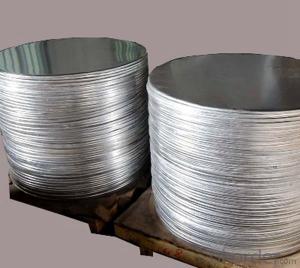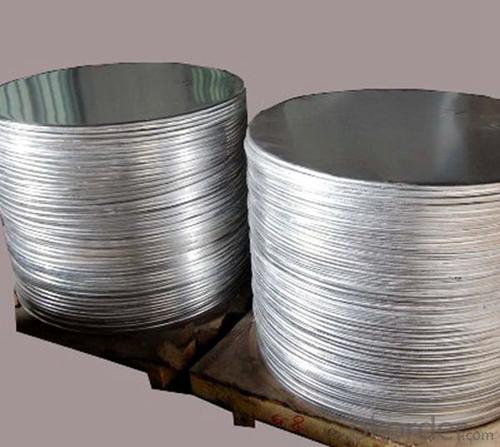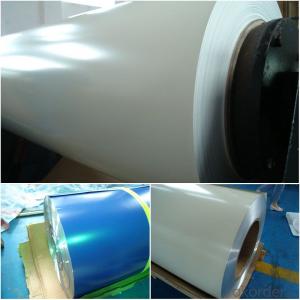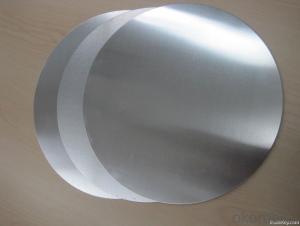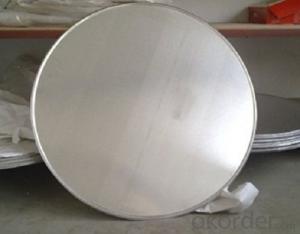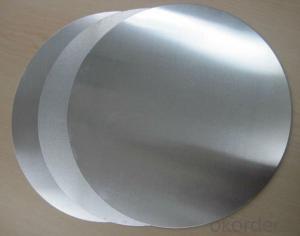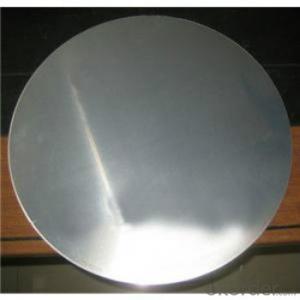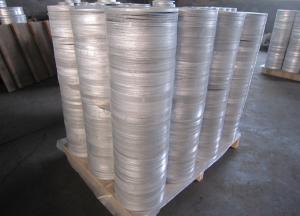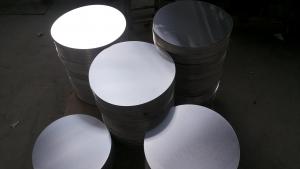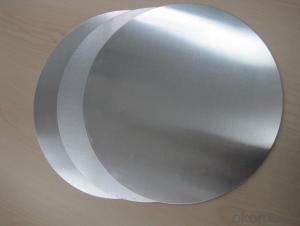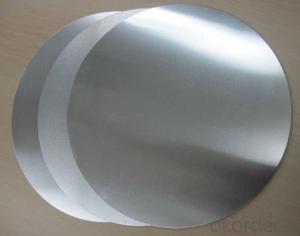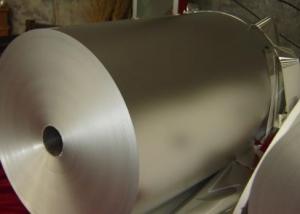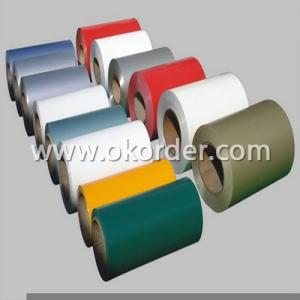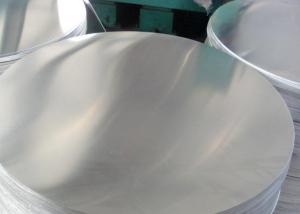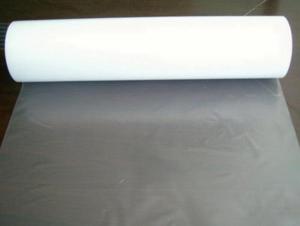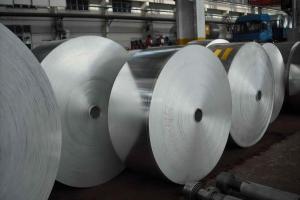Aluminum Hard Anodized Cookware Circle
- Loading Port:
- Shanghai
- Payment Terms:
- TT OR LC
- Min Order Qty:
- 5 m.t.
- Supply Capability:
- 10000 m.t./month
OKorder Service Pledge
OKorder Financial Service
You Might Also Like
Specification
1.Structure of Aluminum Circle for Hard Anodize Cook Ware Description
• Product: Aluminim Circle
• Application: It is used in cookware, engineering, lighting purpose, fried pans, non-sticky pans, cooking pots, kettles, hard anodize cook wire, pressure cooker and house hold utensils, reflector of the light, etc
• Advantage: Deep drawing and hard anodizing quality Aluminum Circle Sheet can be supplied. Our Aluminum Circle is RoHS and REACH compliance and uses well-protected packing. Our circles are excellent material for producing cookware, utensil, pots, pans and kettles.
2.Main Features of the Aluminum Circle for Hard Anodize Cook Ware
• High manufacturing accuracy
• Smooth surface
• No waves
• High strength of extension and yield
• Well packaged
3.Aluminum Circle for Hard Anodize Cook Ware Images
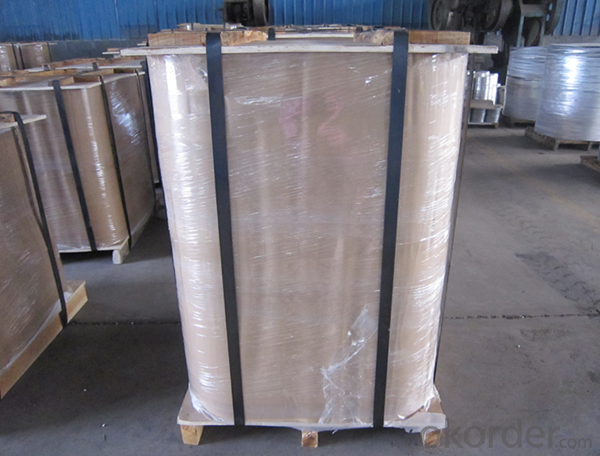
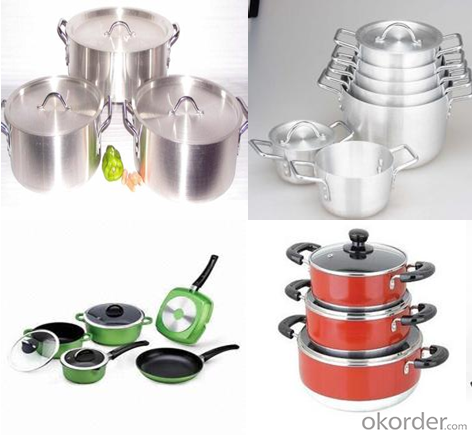
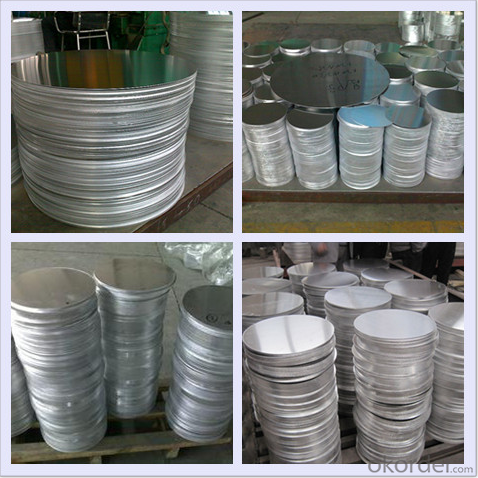
4.Aluminum Circle for Hard Anodize Cook Ware Specification
Alloy | AA1050,AA1060,AA1100 AA3003etc. |
Temper | O,H14 |
Thickness | 0.5MM-4MM |
Diagonal | 100-1200MM |
Standard | GB/T 3880-2006 |
5.FAQ of Aluminum Circle for Hard Anodize Cook Ware
We have organized several common questions for our clients,may help you sincerely:
① How about your company?
A world class manufacturer & supplier of aluminum coil and alloy blanks. Aluminum production base is comprised of 18 aluminum annealers, 10 coil and foil mills, 4 continuous production lines, 2 hot rolling production line and 3 prepainted lines.
Export 5000 tons per month to Asia, America and Middle East. Always do the best for our clients.
②Can you guarantee the quality of the products?
We are responsible for the quality of materials to get a long-term cooperation with clients in a reasonable period of time and we are glad to arrange and coordinate any third party inspection for you.
③What is the delivery time after purchase?
35 day after receiving client’s deposit or correct LC
- Q: This question asks for typical applications of aluminum foil in everyday life.
- <p>Aluminum foil is commonly used for food storage and preservation, as it can be wrapped around food to keep it fresh. It's also widely used in cooking, particularly for baking and roasting, to prevent food from sticking to pans or to seal in moisture and flavor. Beyond culinary uses, aluminum foil is employed in arts and crafts for creating 3D structures or as a reflective surface. It's also used in insulation, as a barrier in construction, and for packing and wrapping items to protect them during shipping. Additionally, aluminum foil is utilized in various industrial processes due to its heat resistance and malleability.</p>
- Q: This question asks about the methods used to determine the hardness of aluminum material.
- <p>The hardness of aluminum can be measured using various standardized tests. The most common methods include the Brinell Hardness Test, where a hard steel or carbide ball is pressed into the aluminum surface, and the Vickers Hardness Test, which uses a diamond pyramid indenter. The Rockwell Hardness Test is also used, applying a diamond cone or steel ball to the surface. The hardness is quantified by the depth of the indentation, and the results are expressed in specific hardness units like BHN (Brinell Hardness Number), HV (Vickers Hardness), or HR (Rockwell Hardness). These tests provide a measure of the material's resistance to deformation, which is crucial for applications requiring strength and durability.</p>
- Q: This question seeks to understand the impact of aluminum exposure on human health, including potential risks and consequences.
- <p>Aluminum is a common element found in the environment, and while it is generally considered safe, there are concerns about its health effects on humans. High levels of aluminum exposure have been linked to neurological disorders, particularly Alzheimer's disease, although the relationship is not definitively proven. Aluminum can also cause bone diseases and anemia, as it can interfere with the absorption of calcium and iron. Long-term exposure to high levels of aluminum may lead to cognitive dysfunction and memory loss. However, the everyday exposure to aluminum from food, water, and medications is considered safe by health authorities, and there is no need for alarm in normal circumstances.</p>
- Q: This question asks about the potential health and safety risks associated with exposure to aluminum.
- <p>Aluminum exposure can lead to several safety issues. Chronic exposure may lead to neurological problems, including cognitive dysfunction and Alzheimer's disease, though the link is still debated. It can also cause bone diseases by leaching calcium from bones. Aluminum may contribute to kidney dysfunction and anemia. In occupational settings, inhalation of aluminum dust can lead to respiratory issues. It's important to note that the human body naturally eliminates aluminum, and the risk of toxicity is generally low under normal conditions. However, in certain medical conditions or with high exposure, aluminum can accumulate and pose health risks.</p>
- Q: This question asks about the process of manufacturing aluminum foil.
- <p>Aluminum foil is made through a process that begins with the extraction of aluminum from its ore, bauxite. The bauxite is first refined to produce aluminum oxide, which is then reduced to aluminum metal using the Hall-H茅roult process. The aluminum is then melted and cast into large ingots. These ingots are heated and rolled into thin sheets in a series of passes through large rolling mills. As the metal cools, it hardens, and the thickness of the sheet is progressively reduced. The final thin sheets are then cut and packaged as aluminum foil. This process requires precision and control to achieve the desired thickness and quality of the foil.</p>
- Q: Is it possible to employ methods for recycling aluminum that are less harmful to the environment?
- <p>Yes, there are less harmful methods for recycling aluminum. One such method is mechanical recycling, which involves shredding and melting aluminum without the need for chemical processing, reducing environmental impact. Additionally, promoting a circular economy by designing products for disassembly and recycling can minimize waste. Encouraging consumer participation in recycling programs and improving recycling technology also contribute to more sustainable aluminum recycling practices.</p>
- Q: Is it possible to utilize aluminum in the creation of innovative tools and equipment?
- <p>Yes, aluminum can be used to make new types of tools and equipment. It is a lightweight, durable, and corrosion-resistant metal, making it ideal for various applications. Aluminum's high strength-to-weight ratio and ease of machinability allow it to be used in the manufacturing of tools, machinery parts, and equipment across industries such as automotive, aerospace, and construction. Additionally, its recyclability and abundance make it an environmentally friendly choice for new tool and equipment designs.</p>
- Q: Is there an alternative method for recycling aluminum besides the conventional process?
- <p>Yes, aluminum can be recycled using different processes. While the conventional process involves melting and recasting, alternative methods include mechanical recycling, which involves shredding and reusing aluminum without melting, and chemical recycling, which breaks down aluminum into its base elements and reassembles them into new products. These methods can be more energy-efficient and environmentally friendly, depending on the specific circumstances and technologies used.</p>
- Q: Explain the different methods used for recycling aluminum.
- <p>Aluminum recycling methods primarily include mechanical recycling and re-melting. Mechanical recycling involves cleaning, shredding, and sorting aluminum waste before reprocessing it into new products. Re-melting involves melting aluminum scrap and then casting it into new aluminum products. This process is energy-efficient, as it requires only 5% of the energy needed to produce aluminum from raw materials. Additionally, aluminum can be recycled indefinitely without losing its properties, making it one of the most recyclable materials.</p>
- Q: Is there a more environmentally friendly method for recycling aluminum?
- <p>Yes, aluminum can be recycled in a more environmentally friendly way. The process of recycling aluminum is already quite efficient, as it requires only 5% of the energy needed to produce new aluminum from raw materials. However, further improvements can be made by optimizing recycling processes, reducing transportation emissions, and increasing the use of recycled aluminum in new products. Additionally, implementing closed-loop recycling systems where aluminum is continuously recycled without loss in quality can minimize waste and environmental impact. Educating consumers about the importance of recycling and improving collection systems can also contribute to more sustainable aluminum recycling practices.</p>
Send your message to us
Aluminum Hard Anodized Cookware Circle
- Loading Port:
- Shanghai
- Payment Terms:
- TT OR LC
- Min Order Qty:
- 5 m.t.
- Supply Capability:
- 10000 m.t./month
OKorder Service Pledge
OKorder Financial Service
Similar products
Hot products
Hot Searches
Related keywords
